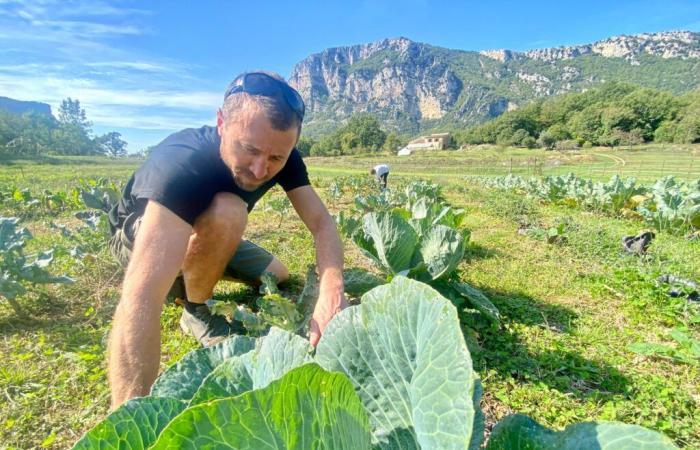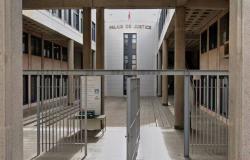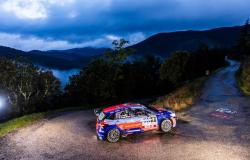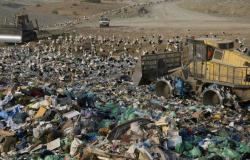Mandelieu-Courmes. Between the two municipalities: 38 kilometers, 45 minutes and 500 meters of altitude. And a hyphen. His name is Florian Bonnet. At 39 years old, this Varois native has been at the helm of the Pépite restaurant since 2006, on the port of La Napoule.
After returning his food waste to the earth in the form of compost, he wanted to go even further in his ecological approach.
He bought a farm, overlooking the Gorges du Loup in 2022, to supply the kitchen of his establishment with products grown on site and in season.
“I do it to find meaning, because I am sensitive to ecologyhe elaborates. I'm not doing this to save money. It's the restaurant that runs the farm.”.
“I knew nothing about agriculture”
Florian Bonnet's ambition: “Create a market garden restaurant, even if it will be a peasant restaurant. We have one hectare. Ultimately we would like to have two.”
His little corner of paradise certified 100% organic had not been exploited for fifteen years. It is entering its second season and is essentially based on the work of Fabien Giraud, the market gardener hired in 2023.
“I'm a restaurateur, even a cafe owner. I knew nothing about agriculture but I love it and I learn every day from Fabien”confides the boss who admires his employee.
“He brought us legitimacy in the valley. He's a popular producer. People said to themselves: 'they really decided to do this seriously'”adds the almost forty-year-old.
From his fields he draws “20% of what we consume in restaurants”. The rest is obtained from producers in Adrets-de-l'Estérel (Var) and Gréolières, but also sometimes from more traditional distribution channels for catering professionals.
“I made the choice to diversify. I am not looking for autonomy. There is a gap in the production of vegetables between us and the Adrets and I appreciate that”he delivers.
In the furrows of the Courmes farm, Fabien grows salads, potatoes, onions, carrots, aromatic herbs, cucumbers, cauliflowers… “Our salads are super beautiful, I’m super happy with the carrots. Root vegetables work well here”asks the farmer.
“We started with a potato monoculture because we make a lot of homemade fries. But it was a mistake. We learned from that. Last year we made 14 tonnes of them.points out Florian Bonnet. We want to do intensive organic farming, grow crops on our boards.”.
The impact on the quality offered to customers? “Last winter we removed the tomatoes from our burgers and replaced them with cabbage. Same in the Caesar salad with beets. It gives you ideas. We want to simplify and create seasonal menus.”
“The quality of life I dreamed of”
On this plateau with clayey soil, near a bubbling spring, where civilization seems so distant, the restaurateur took up residence there and found what he was looking for.
“I have always lived in very remote environmentsbook this one comes from Tanneron. I like simplicity. I want to live simply. I want it to be raw, authentic and homemade. For me, it’s the quality of life I dreamed of.”.
How did he manage to find the funds for this adventure? “I reinvested all the profits from the company in new projects. A restaurant on the Côte d’Azur, if it’s well managed, you make money, we have nothing to complain about”.
The next: completely do without fossil energy on the farm. “We already operate with an electric tractor, we now aim to use solar and hydraulic power to do without gasoline.”
Food waste to feed the earth
“Since 2020 we have managed all our food waste from home, thanks to a sorting system and this is very useful to the market gardener. We experimented for three months and launched“. Pépite produces, on average, 40 kg of waste daily.
A resource that Florian Bonnet wanted to promote: “We buy tons of soil to feed crops when we throw away so much. We wondered what we could do with ours.”
“The objective was to find farmers around us to give them our compost“, explains the restaurateur. He found this partner in the Var. It was the operation of Maxime Behar, from whom Florian Bonnet bought his products, which received the bio-waste from the restaurant.
“Local pruners and landscapers bring their green waste there and the combination of the two creates good compost.“, specifies the boss of Pépite. Vegetables, meat, fish… His teams have “put everything in our compost“.
A process that takes time. “It takes six months before we can use our compost on organic crops.“. The restaurateur highlights the “positive results” and a “qualitative contribution” of this experiment which thus also uses a virtuous system on the mode of transport.
Difficulties
If the approach is to limit the human impact on nature as much as possible, Pépite has experienced difficulties in making its process work.
“What was complicated was the sorting upstream, particularly because of workstations that were not ergonomically adapted..”
Florian mentions “olfactory nuisances in the restaurant sometimes” but also the need for storage space. Finally, the heart of the efforts: “Staff awareness.“
What Florian Bonnet and his partners hope to see happen: “A local reference infrastructure which concentrates and administers the ecosystem, standardization of the process and incentive partnerships between restaurateurs, schools, businesses, individuals and farmers.”
Cited as an example
What Florian Bonnet does is cited as an example of an “agroecological project, sorting and valorization of biowaste”. Thursday September 19, he was invited to Cannes-La-Bocca by the Cannes-Pays de Lérins agglomeration.
In front of an audience of executives and business leaders, the restaurateur presented the Pépite adventure during the 3rd meetings of the Local Decarbonized Force.
An initiative in which he participates “to have an impact and show that it is possible but also to provide economically viable solutions”.
The objective of these meetings: “Share our findings, our projects, create a dynamic,” says the president of the community, David Lisnard. “We are very innovative in the agglomeration and in our communities. There is an abundance of local ideas but everything we do is not known to everyone.






